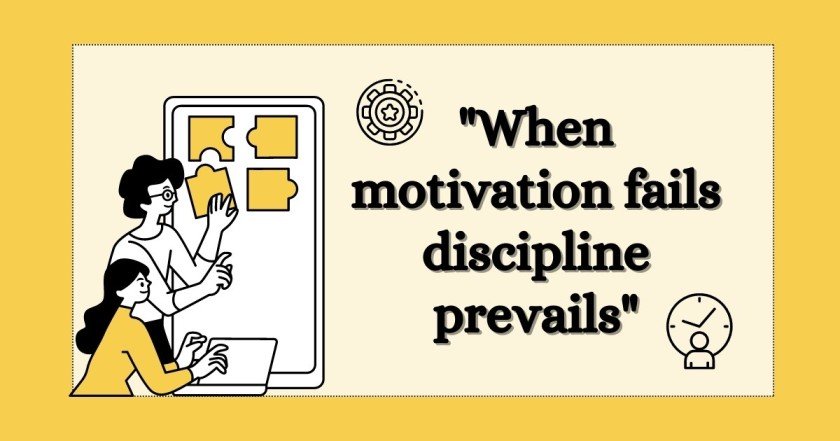Motivation and discipline are essential for success in different aspects of life. Motivation gives us the push and the energy to go after our dreams. Discipline is sticking to a set of rules or routines every time.
Motivation may wane over time or be influenced by different factors. When motivation fails discipline prevails, assuring a constant and focused approach to achieving our goals despite difficulties. Motivation without discipline may lead to disorganized efforts and limited results.
However, by harnessing the power of motivation and discipline, we can nurture personal growth and turn our dreams into reality.
This article delves into the limitations of motivation and explores the power of discipline. Moreover, we will discuss strategies to cultivate discipline, and maintain motivation, ultimately leading to lasting success.
Understanding Motivation and Discipline

Motivation is the force within us that drives us to achieve our goals. The starting point sparks our ambition and goes us to accomplish something significant.
Continuous motivation activates human behavior.
Discipline is training oneself to adhere to a set of rules or principles consistently. It helps to create a strategy that outlines achievable milestones.
It takes self-control, attention, and a firm dedication to the plan, even facing challenges. Discipline sets achievers apart from those who fail.
The limitations of motivation: Why it can fail
Motivation is hailed as the driving force behind success. It fuels our ambition, propels us toward our goals, and pushes us to overcome barriers.
The first wave of motivation can make us feel invincible and unstoppable.
Self-help books, goals, and motivational speakers say motivation can help us achieve anything. Despite celebrating motivation’s strength, it can disappoint us when we need it the most.
With numerous distractions and conflicting responsibilities, it is simple to lose sight of what truly matters.
Inspiration may come and go, leaving us feeling uncertain and doubtful.
The temporary nature of motivation renders it an unreliable companion on a challenging route to our aspirations. Relying solely on motivation sets us up for inconsistency and procrastination.
It can fluctuate based on different factors.
External Factors
External factors, such as criticism, failure, or a lack of support, can diminish our motivation.
Comparisons with what other people have done and the pressures of society can also negatively jolt our drive.
We need to learn to take control of our reason and create an environment that helps us reach our goals.
Motivation comes from within, and it’s hard to stay motivated when external factors interfere.
Internal Obstacles
Internal obstacles, such as self-doubt, fear, and lack of confidence, can hinder our progress. These obstacles often result in delay, avoidance of tasks, or overwhelming feelings.
They can also make our goals feel too distant or difficult to reach. It creates a sense of helplessness.
Lacking interest and falling into self-criticism renders it tough to retain inspiration and progress.
When motivation fails discipline prevails: The power of discipline

Discipline is the unwavering commitment to sticking to a set of principles or routines regardless of how we feel in the moment.
Discipline helps us establish healthy habits. It enables us to consistently put in the work every day without depending on brief moments of inspiration.
Being disciplined leads to increased productivity, better time management, improved focus, and self-confidence.
Discipline allows us to overcome the inevitable hurdles that we encounter along the way.
In adversity, discipline provides the structure and resilience needed to persevere. It keeps us engaged in the long-term benefits rather than being swayed by short-term gratification or temporary failures.
Discipline helps us develop self-control and willpower to resist distractions and temptations. It allows us to make choices that are in tune with our goals instead of acting on a whim.
Discipline is like a muscle; the more we exercise it, the stronger it becomes. Regular practice and setting objectives promote discipline.
By practicing positive behaviors and making conscious choices, we create a solid foundation for success.
We may start strong when motivated but lose steam as time progresses.
However, cultivating discipline creates a solid foundation that helps us push through, even when our initial enthusiasm fades. When motivation fails discipline prevails.
Let’s not count on motivation alone but harness the power of discipline for lasting success.
People also read:
Metaphors Describing Yourself: The Language of Identity
Overwhelmed with Too Many Things to Do
Strategies to Cultivate Discipline
Creating strategies for discipline is crucial for long-term success.
Building a Strong Foundation for Discipline
To build a firm foundation for discipline, set goals, create a routine, and develop self-control.
Set Clear Goals and Priorities
Discipline begins with defining clear and achievable objectives. Specify what you want to accomplish, both short-term and long-term. Arrange these targets based on their significance and relevance.
Create a Daily Routine
A well-structured daily routine provides stability and control over your actions. Design a pattern with dedicated time for work, personal development, relaxation, and leisure. It eliminates decision fatigue and facilitates an ordered ecosystem. Maintain the routine to instill discipline into your daily life.
Develop Self-Control Techniques
Self-control prevents impulsive decisions. Mindfulness, meditation, and deep breathing can enhance self-control and decision-making.
Avoiding Procrastination
Discipline and progress involve recognizing and tackling Procrastination.
The Power of Habits in Cultivating Discipline
Habits can shape our lives in profound ways, both positive and negative.
Forming Positive Habits
Habits decide our daily actions. Identify routines that support your aspirations and concentrate on growing them.
Positive habits, once ingrained, make discipline more sustainable. You don’t need drive or resolve to take action.
Don’t change too many things at once. Begin with a tiny habit and strive to make it a regular part of your day.
Breaking Bad Habits
Conversely, recognize and work on breaking bad habits that hinder your progress.
- Make your habit noticeable. Set a reminder on your phone or computer, or place a sign in your workspace.
- Substitute more optimistic options that share your values.
- Ensure your routine is effortless to execute.
Surrounding Yourself with a Supportive Environment
Share your desires with someone you trust, and inform them up to date on your progress.
Joining a community or having a partner can help with accountability.
Try to avoid negative influences. Surround yourself with people who encourage and inspire discipline.
Create healthy boundaries to protect yourself from the negativity of others. Avoid people who deter or divert you from your goals.
Maintaining Motivation on the Discipline Journey
It’s important to keep your motivation on the discipline journey.
- Rewarding Yourself for Achievements
- Celebrate your accomplishments, however minor.
- Visualize yourself achieving your goals. Mental imagery can boost confidence and discipline.
Overcoming Setbacks and Failures
- Learning from Mistakes. Approach failures as learning opportunities.
- Analyze and learn from mistakes, and use that knowledge to improve. We can learn from failures and bounce back from challenges by embracing discipline.
- Foster resilience and be adaptable in the face of change. Don’t close yourself off to new possibilities.
- Avoid Burnout. Balancing motivation and discipline while incorporating self-care into our routines prevents burnout.
The Long-Term Benefits of Discipline
Discipline is a trait that can be honed and learned. There are many long-term benefits of discipline, including:
- Discipline leads to increased productivity and efficiency. You can achieve more in less time by staying focused.
- Discipline boosts self-confidence and self-esteem, helping you tackle more enormous challenges.
- Disciplined people have a higher chance of achieving their long-term aspirations. Determination and hard work lead to notable achievements.
How does motivation lead to discipline?
Motivation and discipline are linked, but they work in distinct ways. Motivation can lead to discipline in a few ways:
1. Motivation provides a clear sense of purpose and direction. A strong desire to attain specific targets increases the likelihood of complying with the course of action.
2. Motivation energies to take steps towards their objectives.
3. Motivation helps individuals overcome hindrances by reminding them of the rewards and benefits of achieving their aims. When things get tough, motivation can help you survive.
4. Discipline arises from consistent action. Motivation reminds individuals of the importance of their goals.
5. Motivation encourages delayed gratification and resisting temptations.
6. In the face of disappointments, motivation is a source of strength, helping individuals bounce back and continue their journey.
7. Motivation retain focus to avoid distractions and maintain discipline.
8. Motivation encourages individuals to learn, improve, and adapt. In comparison, discipline drives them to pursue personal growth consistently.
In the end, discipline turns motivation into tangible results. Success and fulfillment come from encouragement and hard work toward objectives.
In summary, discipline maintains effort after motivation gets you started. They work well together and encourage people to live affluent lives.
However, it’s important to note that motivation is not the same as discipline. But you need both motivation and discipline to attain your objectives.
Conclusion
In conclusion, understanding the synergy between motivation and discipline is vital for achieving lasting success and personal growth.
Although motivation can be powerful, it has limitations and can diminish over time, making discipline the key to maintaining progress and overcoming obstacles.
External factors and internal barriers can hinder motivation, but discipline keeps us firm and adaptive even in challenging circumstances.
When motivation fails discipline prevails. By cultivating discipline through setting clear goals, forming positive habits, and creating a supportive environment, we can utilize the forces of both motivation and discipline.
Combining motivation and discipline paves the way for a fulfilling and successful life. So, let us embrace motivation and discipline on our pursuit of hopes and aspirations